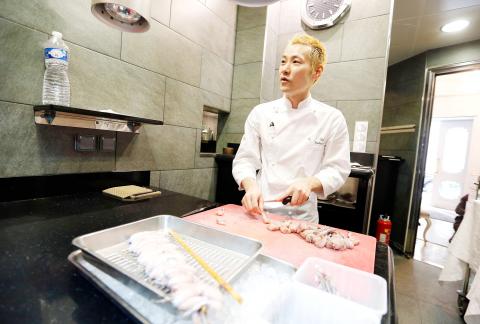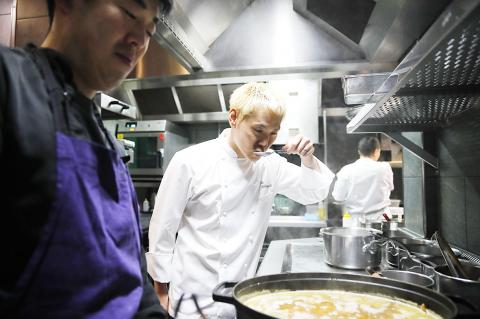Chef Kei Kobayashi is speaking his mind — something he says it took moving to France to learn.
Less than 24 hours after he became the first ever Japanese cook to win the maximum three Michelin stars in France, the phones are ringing off the hook at his Paris restaurant, Kei.
The last of the lunchtime diners are skipping out of his minimalist dining room not far from the Louvre, grinning from ear to ear.

Photo: AFP
They have just eaten a piece of history, and at 58 euros (US$63) for a set lunch, a bargain into the bag.
Kobayashi is holding forth in his clinically clean kitchen as his small team scurry around him.
“Japanese people are usually very quiet. But you cannot survive in France like that,” he said.

Photo: AP
The dozen or so other Japanese chefs who have been making waves in the rarefied world of French haute cuisine over the last few years are usually meekness incarnate.
They bow, say a few humble halting words of thanks and are off.
Not Kobayashi. The first thing that the 42-year-old said after getting his third star was how difficult and demanding he was.
With his gelled bleached blond hair, there is something of the showman about the young blade who readily admits to driving his cooks ferociously hard.
But it was not always so, he insisted, claiming France has changed him.
‘I SAY WHAT I MEAN’
“I am direct now. Like the French, I say what I mean,” he said.
“I am a very difficult guy,” he added, as he barked out an order in his small but perfectly designed kitchen. “Working with me means lots of stress. I watch and check everything.”
“Compared to a French chef” — who are not renowned for being touchy-feely — “I am probably more difficult,” he smiled.
But Kobayashi was careful not to ruffle feathers when asked if he and other young Japanese were beating the French at their own game and in their own back garden.
“France has accepted us and given us a place, so I thank France,” he said, adding that the Japanese cooks have been trained in the French tradition for nearly 150 years.
And indeed, it was watching a documentary about the nouvelle cuisine pioneer Alain Chapel that inspired Kobayashi to follow his father — a chef specialising in traditional Japanese kaiseki cuisine — into the kitchen.
Like his compatriot Yosuke Suga — who topped the La Liste’s ranking of the world’s best restaurants this year with his tiny Tokyo table, Sugalab, and who is only a few months his senior — Kobayashi decided to learn at the feet of his French heroes.
While some French gastronomes have implied that Kobayashi’s restaurant was not quite grand enough for the culinary holy grail of three stars, even the Michelin guide’s worst enemy believes its inspectors got it right.
French chef Marc Veyrat, who lost his third star last year and took Michelin to court in the notorious “Cheddargate” case, tipped his toque to him.
CRITICS ‘TRANSPORTED’
“I say ‘Bravo!’,” Veyrat said. “It’s great that people like him are coming here.”
Kobayashi, who was born in Nagano, opened his Paris restaurant nine years ago with his wife Chikako after working under a series of legendary French three-star chefs including Alain Ducasse, one of his mentors.
His pastry chef Toshiya Takatsuka — who has also been making a name for himself in France — said he decided to move to Paris to work under Kobayashi after eating at Kei in 2013.
“I could immediately feel the spirit of the chef, the concentration — everything was so absolutely right,” he said.
Working with him, however, is no bed of roses, he admitted.
“He puts you under the maximum pressure. He always tells the truth, he never hides things. He says what he thinks — there is no filter,” 35-year-old Takatsuka added.
“But I think he is harder on himself than he is on others... He has thought everything through in the restaurant, as he keeps saying, it’s a theater.”
And its star is Kobayashi’s cooking, with the dining room’s sparse grey interior designed to point up his startling creations like his “Garden of crunchy vegetables” which transported the Michelin inspectors.
When asked why there were no pictures on the walls, he replied, “My cuisine provides the necessary colour.” As Kobayashi mixes the salad of up to 40 ingredients covered in a citrus mousse, “in which every spoonful has a different taste,” it’s hard to disagree.

Taiwan has next to no political engagement in Myanmar, either with the ruling military junta nor the dozens of armed groups who’ve in the last five years taken over around two-thirds of the nation’s territory in a sprawling, patchwork civil war. But early last month, the leader of one relatively minor Burmese revolutionary faction, General Nerdah Bomya, who is also an alleged war criminal, made a low key visit to Taipei, where he met with a member of President William Lai’s (賴清德) staff, a retired Taiwanese military official and several academics. “I feel like Taiwan is a good example of

March 2 to March 8 Gunfire rang out along the shore of the frontline island of Lieyu (烈嶼) on a foggy afternoon on March 7, 1987. By the time it was over, about 20 unarmed Vietnamese refugees — men, women, elderly and children — were dead. They were hastily buried, followed by decades of silence. Months later, opposition politicians and journalists tried to uncover what had happened, but conflicting accounts only deepened the confusion. One version suggested that government troops had mistakenly killed their own operatives attempting to return home from Vietnam. The military maintained that the

Before the last section of the round-the-island railway was electrified, one old blue train still chugged back and forth between Pingtung County’s Fangliao (枋寮) and Taitung (台東) stations once a day. It was so slow, was so hot (it had no air conditioning) and covered such a short distance, that the low fare still failed to attract many riders. This relic of the past was finally retired when the South Link Line was fully electrified on Dec. 23, 2020. A wave of nostalgia surrounded the termination of the Ordinary Train service, as these train carriages had been in use for decades

Lori Sepich smoked for years and sometimes skipped taking her blood pressure medicine. But she never thought she’d have a heart attack. The possibility “just wasn’t registering with me,” said the 64-year-old from Memphis, Tennessee, who suffered two of them 13 years apart. She’s far from alone. More than 60 million women in the US live with cardiovascular disease, which includes heart disease as well as stroke, heart failure and atrial fibrillation. And despite the myth that heart attacks mostly strike men, women are vulnerable too. Overall in the US, 1 in 5 women dies of cardiovascular disease each year, 37,000 of them